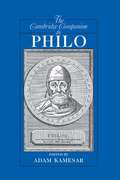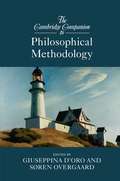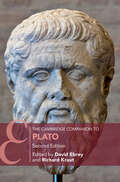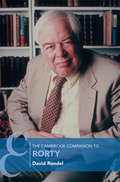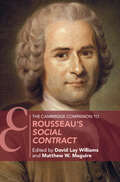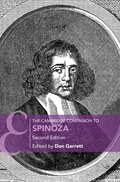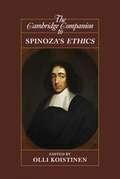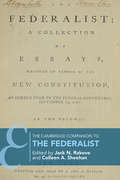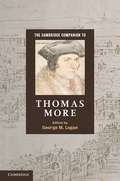- Table View
- List View
The Cambridge Companion to Philo (Cambridge Companions to Philosophy)
by Adam KamesarThe works of Philo of Alexandria, a slightly older contemporary of Jesus and Paul, constitute an essential source for the study of Judaism and the rise of Christianity. They are also of extreme importance for understanding the Greek philosophy of the time and help to explain the onset of new forms of spirituality that would dominate the following centuries. This 2009 handbook presents an account of Philo's achievements. It contains a profile of his life and times, a systematic overview of his many writings, and survey chapters of the key features of his thought, as seen from the perspectives of Judaism and Greek philosophy. The volume concludes with a section devoted to Philo's influence and significance. Composed by an international team of experts, The Cambridge Companion to Philo gives readers a sense of the state of scholarship and provides depth of vision in key areas of Philonic studies.
The Cambridge Companion to Philosophical Methodology (Cambridge Companions to Philosophy)
by Søren Overgaard Giuseppina D’oroThe Cambridge Companion to Philosophical Methodology offers clear and comprehensive coverage of the main methodological debates and approaches within philosophy. The chapters in this volume approach the question of how to do philosophy from a wide range of perspectives, including conceptual analysis, critical theory, deconstruction, experimental philosophy, hermeneutics, Kantianism, methodological naturalism, phenomenology, and pragmatism. They explore general conceptions of philosophy, centred on the question of what the point of philosophising might be; the method of conceptual analysis and its recent naturalistic critics and competitors; perspectives from continental philosophy; and also a variety of methodological views that belong neither to the mainstream of analytic philosophy, nor to continental philosophy as commonly conceived. Together they will enable readers to grasp an unusually wide range of approaches to methodological debates in philosophy. Presents the most important current methodological debates and approaches within philosophy. Covers both analytical and continental approaches. Includes essays on methodological approaches that are often overlooked.
The Cambridge Companion to Plato
by Richard KrautPlato stands as the fount of our philosophical tradition, being the first Western thinker to produce a body of writing that touches upon a wide range of topics still discussed by philosophers today. In a sense he invented philosophy as a distinct subject, for although many of these topics were discussed by his intellectual predecessors and contemporaries, he was the first to bring them together by giving them a unitary treatment. This volume contains fourteen new essays discussing Plato's views about knowledge, reality, mathematics, politics, ethics, love, poetry, and religion. There are also analyses of the intellectual and social background of his thought, the development of his philosophy throughout his career, the range of alternative approaches to his work, and the stylometry of his writing.
The Cambridge Companion to Plato (Cambridge Companions to Philosophy)
by Richard Kraut David EbreyThe first edition of the Cambridge Companion to Plato (1992), edited by Richard Kraut, shaped scholarly research and guided new students for thirty years. This new edition introduces students to fresh approaches to Platonic dialogues while advancing the next generation of research. Of its seventeen chapters, nine are entirely new, written by a new generation of scholars. Six others have been thoroughly revised and updated by their original authors. The volume covers the full range of Plato's interests, including ethics, political philosophy, epistemology, metaphysics, aesthetics, religion, mathematics, and psychology. Plato's dialogues are approached as unified works and considered within their intellectual context, and the revised introduction suggests a way of reading the dialogues that attends to the differences between them while also tracing their interrelations. The result is a rich and wide-ranging volume which will be valuable for all students and scholars of Plato.
The Cambridge Companion to Plato's Republic
by G. R. F. FerrariThis 2007 Companion provides a comprehensive account of this outstanding work, which remains among the most frequently read works of Greek philosophy, indeed of Classical antiquity in general. The sixteen essays, by authors who represent various academic disciplines, bring a spectrum of interpretive approaches to bear in order to aid the understanding of a wide-ranging audience, from first-time readers of the Republic who require guidance, to more experienced readers who wish to explore contemporary currents in the work's interpretation. The three initial chapters address aspects of the work as a whole. They are followed by essays that match closely the sequence in which topics are presented in the ten books of the Republic. Since the Republic returns frequently to the same topics by different routes, so do the authors of this volume, who provide the readers with divergent yet complementary perspectives by which to appreciate the Republic's principal concerns.
The Cambridge Companion to Postmodernism
by Steven ConnorThe Cambridge Companion to Postmodernism offers a comprehensive introduction to postmodernism. The Companion examines the different aspects of postmodernist thought and culture that have had a significant impact on contemporary cultural production and thinking. Topics discussed by experts in the field include postmodernism's relation to modernity, and its significance and relevance to literature, film, law, philosophy, architecture, religion and modern cultural studies. The volume also includes a useful guide to further reading and a chronology. This is an essential aid for students and teachers from a range of disciplines interested in postmodernism in all its incarnations. Accessible and comprehensive, this Companion addresses the many issues surrounding this elusive, enigmatic and often controversial topic.
The Cambridge Companion to Pragmatism
by Alan MalachowskiPragmatism established a philosophical presence over a century ago through the work of Charles Peirce, William James and John Dewey, and has enjoyed an unprecedented revival in recent years owing to the pioneering efforts of Richard Rorty and Hilary Putnam. The essays in this volume explore the history and themes of classic pragmatism, discuss the revival of pragmatism and show how it engages with a range of areas of inquiry including politics, law, education, aesthetics, religion and feminism. Together they provide readers with an overview of the richness and vitality of pragmatist thinking and the influence that it continues to exert both in philosophy and other disciplines. The volume will be of interest to students and scholars of pragmatism, American philosophy and political theory.
The Cambridge Companion to Quine
by Roger F. Gibson Jr.W. V. Quine (1908–2000) was quite simply the most distinguished analytic philosopher of the later half of the twentieth century. His celebrated attack on the analytic/synthetic tradition heralded a major shift away from the views of language descended from logical positivism. His most important book, Word and Object, introduced the concept of indeterminacy of radical translation, a bleak view of the nature of the language with which we ascribe thoughts and beliefs to ourselves and others. Quine is also famous for the view that epistemology should be naturalized, that is conducted in a scientific spirit with the object of investigating the relationship between the inputs of experience and the outputs of belief. The eleven essays in this volume cover all the central topics of Quine's philosophy: the underdetermination of physical theory, analycity, naturalism, propositional attitudes, behaviorism, reference and ontology, positivism, holism and logic.
The Cambridge Companion to Rawls
by Samuel FreemanEach volume of this series of companions to major philosophers contains specially commissioned essays by an international team of scholars and will serve as a reference work for students and nonspecialists. John Rawls is the most significant and influential philosopher and moral philosopher of the twentieth century. His work has profoundly shaped contemporary discussions of social, political and economic justice in philosophy, law, political science, economics and other social disciplines. In this exciting collection of essays, many of the world's leading political and moral theorists discuss the full range of Rawls's contribution to the concepts of political and economic justice, democracy, liberalism, constitutionalism, and international justice. There are also assessments of Rawls's controversial relationships with feminism, utilitarianism and communitarianism. New readers will find this to be an accessible guide to Rawls. Advanced students and specialists will find a conspectus of developments in the interpretation of Rawls.
The Cambridge Companion to Renaissance Philosophy
by James HankinsThe Cambridge Companion to Renaissance Philosophy, published in 2007, provides an introduction to a complex period of change in the subject matter and practice of philosophy. The philosophy of the fourteenth through sixteenth centuries is often seen as transitional between the scholastic philosophy of the Middle Ages and modern philosophy, but the essays collected here, by a distinguished international team of contributors, call these assumptions into question, emphasizing both the continuity with scholastic philosophy and the role of Renaissance philosophy in the emergence of modernity. They explore the ways in which the science, religion and politics of the period reflect and are reflected in its philosophical life, and they emphasize the dynamism and pluralism of a period which saw both new perspectives and enduring contributions to the history of philosophy. This will be an invaluable guide for students of philosophy, intellectual historians, and all who are interested in Renaissance thought.
The Cambridge Companion to Rorty (Cambridge Companions to Philosophy)
by David RondelThis Companion provides a systematic introductory overview of Richard Rorty's philosophy. With chapters from an interdisciplinary group of leading scholars, the volume addresses virtually every aspect of Rorty's thought, from his philosophical views on truth and representation and his youthful obsession with wild orchids to his ruminations on the contemporary American Left and his prescient warning about the election of Donald Trump. Other topics covered include his various assessments of classical American pragmatism, feminism, liberalism, religion, literature, and philosophy itself. Sympathetic in some cases, in others sharply critical, the essays will provide readers with a deep and illuminating portrait of Rorty's exciting brand of neopragmatism.
The Cambridge Companion to Rousseau's Social Contract (Cambridge Companions to Philosophy)
by David Lay Williams Matthew W. MaguireWhat is freedom? What is equality? And what is sovereignty? A foundational text of modern political philosophy, Rousseau's Social Contract has generated much debate and exerted extraordinary influence not only on political thought, but also modern political history, by way of the French Revolution and other political events, ideals, and practices. The Social Contract is regularly studied in undergraduate courses of philosophy, political thought, and modern intellectual history, as well as being the subject of graduate seminars in numerous disciplines. The book inspires an ongoing flow of scholarly articles and monographs. Few texts have offered more influential and important answers to research questions than Rousseau's Social Contract, and in this new Cambridge Companion, a multidisciplinary team of contributors provides new ways to navigate this masterpiece of political philosophy- and its animating questions.
The Cambridge Companion to Sartre
by Christina HowellsThis is one of the most comprehensive and up-to-date surveys of the philosophy of Sartre, by some of the foremost interpreters in the United States and Europe. The essays are both expository and original, and cover Sartre's writings on ontology, phenomenology, psychology, ethics, and aesthetics, as well as his work on history, commitment, and progress; a final section considers Sartre's relationship to structuralism and deconstruction. Providing a balanced view of Sartre's philosophy and situating it in relation to contemporary trends in Continental philosophy, the volume shows that many of the topics associated with Lacan, Foucault, Lévi-Strauss, and Derrida are to be found in the work of Sartre, in some cases as early as 1936. A special feature of the volume is the treatment of the recently published and hitherto little studied posthumous works. Thus new readers and nonspecialists will find this the most convenient, accessible guide to Sartre currently available. Advanced students and specialists will find a conspectus of recent developments in the interpretation of Sartre.
The Cambridge Companion to Schopenhauer
by Christopher JanawayArthur Schopenhauer (1788-1860) is something of a maverick figure in the history of philosophy. He produced a unique theory of the world and human existence based upon his notion of will. This collection analyses the related but distinct components of will from the point of view of epistemology, metaphysics, philosophy of mind, aesthetics, ethics, and the philosophy of psychoanalysis. This volume explores Schopenhauer's philosophy of death, his relationship to the philosophy of Kant, his use of ideas drawn from both Buddhism and Hinduism, and the important influence he exerted on Nietzsche, Freud, and Wittgenstein.
The Cambridge Companion to Seneca
by Shadi Bartsch Alessandro SchiesaroThe Roman statesman, philosopher, and playwright Lucius Annaeus Seneca dramatically influenced the progression of Western thought. His works have had an unparalleled impact on the development of ethical theory, shaping a code of behavior for dealing with tyranny in his own age that endures today. This companion thoroughly examines the complete Senecan corpus, with special emphasis on the aspects of his writings that have challenged interpretation. The authors place Seneca in the context of the ancient world and trace his impressive legacy in literature, art, religion, and politics from Neronian Rome to the early modern period. Through critical discussion of the recent proliferation of Senecan studies, this volume compellingly illustrates how the perception of Seneca and his particular type of Stoicism has evolved over time. It provides a comprehensive overview that will benefit students and scholars in classics, comparative literature, history, philosophy, and political theory, as well as general readers.
The Cambridge Companion to Socrates
by Donald R. MorrisonThe Cambridge Companion to Socrates is a collection of essays providing a comprehensive guide to Socrates, the most famous Greek philosopher. Because Socrates himself wrote nothing, our evidence comes from the writings of his friends (above all Plato), his enemies, and later writers. Socrates is thus a literary figure as well as a historical person. Both aspects of Socrates' legacy are covered in this volume. Socrates' character is full of paradox, and so are his philosophical views. These paradoxes have led to deep differences in scholars' interpretations of Socrates and his thought. Mirroring this wide range of thought about Socrates, this volume's contributors are unusually diverse in their background and perspective. The essays in this volume were authored by classical philologists, philosophers and historians from Germany, Francophone Canada, Britain and the United States, and they represent a range of interpretive and philosophical traditions.
The Cambridge Companion to Spinoza
by Don GarrettBenedict (Baruch) de Spinoza has been one of the most inspiring and influential philosophers of the modern era, yet also one of the most difficult and most frequently misunderstood. Spinoza sought to unify mind and body, science and religion, and to derive an ethics of reason, virtue, and freedom 'in geometrical order' from a monistic metaphysics. Of all the philosophical systems of the seventeenth century it is his that speaks most deeply to the twentieth century. The essays in this volume provide a clear and systematic exegesis of Spinoza's thought informed by the most recent scholarship. They cover his metaphysics, epistemology, philosophy of science, psychology, ethics, political theory, theology, and scriptural interpretation, as well as his life and influence on later thinkers.
The Cambridge Companion to Spinoza (Cambridge Companions to Philosophy)
by Don GarrettBenedict (Baruch) de Spinoza (1632–1677) was one of the most systematic, inspiring, and influential philosophers of the early modern period. From a pantheistic starting point that identified God with Nature as all of reality, he sought to demonstrate an ethics of reason, virtue, and freedom while unifying religion with science and mind with body. His contributions to metaphysics, epistemology, psychology, ethics, politics, and the analysis of religion remain vital to the present day. Yet his writings initially appear forbidding to contemporary readers, and his ideas have often been misunderstood. This second edition of The Cambridge Companion to Spinoza includes new chapters on Spinoza's life and his metaphysics, epistemology, philosophy of religion, and biblical scholarship, as well as extensive updates to the previous chapters and bibliography. A thorough, reliable, and accessible guide to this extraordinary philosopher, it will be invaluable to anyone who wants to understand what Spinoza has to teach.
The Cambridge Companion to Spinoza'S Ethics
by Olli KoistinenSince its publication in 1677, Spinoza's Ethics has fascinated philosophers, novelists, and scientists alike. It is undoubtedly one of the most exciting and contested works of Western philosophy. Written in an austere, geometrical fashion, the work teaches us how we should live, ending with an ethics in which the only thing good in itself is understanding. Spinoza argues that only that which hinders us from understanding is bad and shows that those endowed with a human mind should devote themselves, as much as they can, to a contemplative life. This 2009 Companion volume provides a detailed, accessible exposition of the Ethics. Written by an internationally known team of scholars, it is the first anthology to treat the whole of the Ethics and is written in an accessible style.
The Cambridge Companion to The Federalist (Cambridge Companions to Philosophy)
by Jack N. Rakove Colleen A. SheehanThe eighty-five Federalist essays written by Alexander Hamilton, John Jay, and James Madison as 'Publius' to support the ratification of the Constitution in 1787–88 are regarded as the preeminent American contribution to Western political theory. Recently, there have been major developments in scholarship on the Revolutionary and Founding era as well as increased public interest in constitutional matters that make this a propitious moment to reflect on the contributions and complexity of The Federalist. This volume of specially commissioned essays covers the broad scope of 'Publius' work, including historical, political, philosophical, juridical, and moral dimensions. In so doing, they bring the design and arguments of the text into focus for twenty-first century scholars, students, and citizens and show how these diverse treatments of The Federalist are associated with an array of substantive political and constitutional perspectives in our own time.
The Cambridge Companion to Thomas More
by George M. LoganThis Companion offers a comprehensive introduction to the life and work of a major figure of the modern world. Combining breadth of coverage with depth, the book opens with essays on More's family, early life and education, his literary humanism, virtuoso rhetoric, illustrious public career and ferocious opposition to emergent Protestantism, and his fall from power, incarceration, trial and execution. These chapters are followed by in-depth studies of five of More's major works - Utopia, The History of King Richard the Third, A Dialogue Concerning Heresies, A Dialogue of Comfort against Tribulation and De Tristitia Christi - and a final essay on the varied responses to the man and his writings in his own and subsequent centuries. The volume provides an accessible overview of this fascinating figure to students and other interested readers, whilst also presenting, and in many areas extending, the most important modern scholarship on him.
The Cambridge Companion to Thomas Reid
by Terence Cuneo René Van WoudenbergWidely acknowledged as the principal architect of Scottish common sense philosophy, Thomas Reid is increasingly recognized today as one of the finest philosophers of the eighteenth century. Combining a sophisticated response to the skeptical and idealist views of his day, Reid's thought represents an important alternative to Humean skepticism, Kantian idealism and Cartesian rationalism. This work covers not only his philosophy but his scientific research and extensive historical influence.
The Cambridge Companion to Tocqueville
by Cheryl B. WelchThe Cambridge Companion to Tocqueville contains a set of critical interpretive essays by internationally renowned scholars on the work of Alexis de Tocqueville. The essays cover Tocqueville's major themes (liberty, equality, democracy, despotism, civil society, religion) and texts (Democracy in America, Recollections, Old Regime and the Revolution, other important reports, speeches and letters). The authors analyze both Tocqueville's contributions as a theorist of modern democracy and his craft as a writer. Collections of secondary work on Tocqueville have tended to fall into camps, either bringing together only scholars from one point of view or discipline, or treating only one major text. This Companion transgresses national, ideological, disciplinary, and textual boundaries to bring together the best in recent Tocqueville scholarship. The essays not only introduce Tocqueville's major themes and texts, but also put forward provocative arguments that advance the field of Tocqueville studies.
The Cambridge Companion to Utilitarianism
by Dale E. Miller Ben EgglestonUtilitarianism, the approach to ethics based on the maximization of overall well-being, continues to have great traction in moral philosophy and political thought. This Companion offers a systematic exploration of its history, themes, and applications. First, it traces the origins and development of utilitarianism via the work of Jeremy Bentham, John Stuart Mill, Henry Sidgwick, and others. The volume then explores issues in the formulation of utilitarianism, including act versus rule utilitarianism, actual versus expected consequences, and objective versus subjective theories of well-being. Next, utilitarianism is positioned in relation to Kantianism and virtue ethics, and the possibility of conflict between utilitarianism and fairness is considered. Finally, the volume explores the modern relevance of utilitarianism by considering its practical implications for contemporary controversies such as military conflict and global warming. The volume will be an important resource for all those studying moral philosophy, political philosophy, political theory, and history of ideas.
The Cambridge Companion to Virtue Ethics
by Daniel C. RussellVirtue ethics has emerged from a rich history, in which both Aristotle and Aquinas have played an important role, to become one of the fastest-growing fields in contemporary ethics. In this volume of newly commissioned essays, leading moral philosophers offer a comprehensive overview of virtue ethics. They examine the theoretical structure of virtue ethics and its place in contemporary moral theory and other topics discussed include the history of virtue-based approaches to ethics, what makes these approaches distinctive, what they can say about specific practical issues and where we can expect them to go in the future. This Companion will be useful to students of virtue ethics and the history of ethics and to others who want to understand how virtue ethics is changing the face of contemporary moral philosophy.
